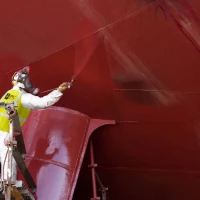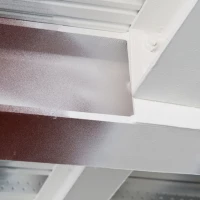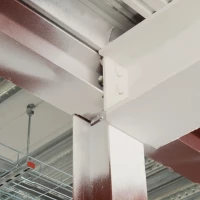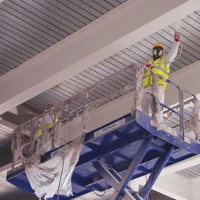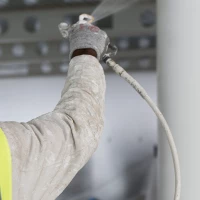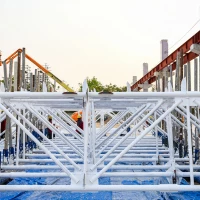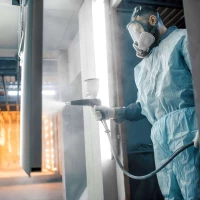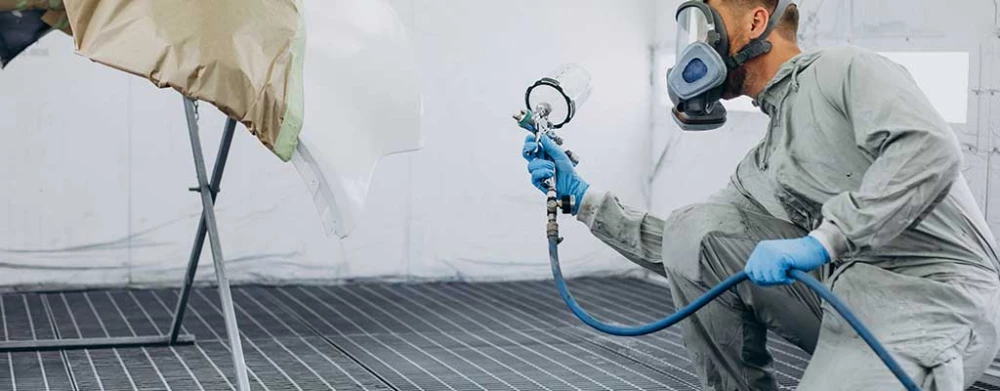
Intumescent Coating in Ceann a-staigh Chuil in Ceann a-staigh Chuil
Get in touchIntumescent coatings are one of the most effective and simplest forms of fire protection in Ceann a-staigh Chuil, and we can provide them to a range of environments.
This fire retardant paint is commonly used in large-scale industrial settings and heavy load-bearing sites due to the fact it can protect against the collapse of the structure through insulation.
By adding an insulating layer to key elements of the structure, such as the columns, beams, industrial flooring in Ceann a-staigh Chuil, and roofs, the integrity of the environment remains to allow for the safe removal of all people inside during a fire.
Our company provides a range of fire retardant paints in Ceann a-staigh Chuil and relies on premium unique patented technology to create a coating that is highly resistant to any fire situation.
Fire-resistant paint is a great way to ensure any environment is covered for fire resistance, and our company can work to meet local requirements.
To learn more about what our industrial painting contractors in Ceann a-staigh Chuil can do for you, then please contact the team today.
Intumescent Coatings Cost per m2
The average cost of a fire-resistant paint like this in Ceann a-staigh Chuil is between £20 - £30 per m2.
The total cost of this passive fire protection coating can vary based on several major factors, including the following:
Location
Size of the area for the fire retardant paint
Type of intumescent paints used
The thickness of the coatings
Where the paint is used, such as whether this is on a steel member or beam

Intumescent fire coatings can also vary in price based on the level of film thickness and, therefore, the fire resistance that they offer.
While all intumescent paints are designed to withstand fire exposure, how long they will last in a fire will vary based on the kind of paints that are used and the film thickness once applied to structural steel elements.
To request a quote for our passive fire protection services in Ceann a-staigh Chuil, please contact the team today.
Intumescent Paint Advantages
Intumescent paints are the lightest form of passive fire protection and can offer a range of benefits to the intended environment in which they are applied.
This is an innovative hybrid intumescent coating system that provides fire protection by securing the integrity of structures when applied to structural steel, preventing structural failure during a fire, and allowing all parties to escape safely during an emergency.
The levels of fire protection offered can vary based on the type you choose and the application process. Nonetheless, it is an excellent hydrocarbon fire protection for a range of environments offering benefits such as:
Cost-Effective
Intumescent painting is a cost effective way to ensure fire safety at your workplace or residence.
By having fire retardant paint installed, you can save a lot of money in damages should a fire occur.
These coatings are ideal for such environments as construction project sites, newly built properties, and heavy-load warehouses because they tend to be a cheaper option.
Ideal For All Environments
The way intumescent coatings are typically applied makes them incredibly versatile.
With cladding arrangements in Ceann a-staigh Chuil and multiple layer application available, this form of protection can be used in more locations than standard fire retardant paint.
This durable film can be applied in public buildings but is also ideal for harsher environments, such as offshore marine industries or even free-standing systems, due to the application process we provide.
Whether you are looking for an on or off-site application, we can help and will work to any project specification.
Offers Both Thermal Protection and Acoustic Insulation
Based on the dry film thickness that is used, these coatings can also provide thermal protection as well as fire protection in all environments.
The fact it delivers ground breaking performance makes this form of fire protection ideal for a range of locations, including those throughout the chemical industry.
Provides Passive Fire Protection
Whereas active fire protection requires a trigger to offer fire protection, such as a sprinkler system that will be triggered by smoke, these fire retardant paints offer passive fire protection.
This means your site will be protected from the very first coat of fire retardant paint and does not need to be triggered, like active fire protection.
Types of Intumescent Coatings
Based on the required protection criteria of your property or of the site, several coatings can be applied, including:
Ceann a-staigh Chuil Water Based Intumescent
Water-based coating offers a fairly low dry film thickness and is designed to be more eco-friendly than other options.
The fast cure properties and the fact that this is the less chemically smelling option make water-based coatings ideal for indoor environments.
Ceann a-staigh Chuil Solvent Based Intumescent
Solvent-based coatings tend also to have a low dry film thickness which allows for speed and quality during application.
They can be completely dry within minutes, allowing for the application of an extra layer instantly.
The original thickness of solvent-based coatings means they can be applied in semi-exposed environments and can be applied directly to steel.

Ceann a-staigh Chuil Epoxy Based Intumescent
Epoxy-based intumescent can be used to offer hydrocarbon protection which makes it ideal for the chemical industry and is used in harsher environments, including offshore applications.
It is important to note that to reach the required dry film thickness for most environments, multiple coats of this will need to be applied along with a compatible primer.
Ceann a-staigh Chuil Hybrid Intumescent
Hybrid coatings, such as the Nullfire SC902 Hybrid, do not require multiple coats like the vast majority of other options and instead can provide the same level of protection with one coat.
This form of coating is ideal for your next construction project as it can dry quickly.
To determine which is the best for your needs, please contact the team today.
What is Intumescent Paint?
Intumescent paint, when it is exposed to the heat of a fire, is rapidly transformed and will expand many times its original thickness and create a carbonous char.
Some paints or coatings can reach up to 100 times their original thickness based on temperature variations and application, which can be done using large plural spray equipment, airless spray paint equipment, or through brush and roller applications.
The resultant char reduces the conduction of heat from the fire to the building structure and therefore delays how long it will take to reach structural failure.
This delay allows for people to safely leave the premises and ensures that everyone in the environment is protected during a fire emergency.
Intumescent Paint Colours Ceann a-staigh Chuil
Our company can provide intumescent paints in a variety of finishes.
Following the application of an anti-corrosion primer or zinc-rich primer, and based on the kind of coating you require and the coating itself, we can then apply a suitable tie coat of colour to suit the environment.

Popular colours include:
Black
Grey
White
Green
Blue
Red
Orange
Purple
Yellow
Brown
Our team can provide coloured intumescent steel paint to shop fronts in Ceann a-staigh Chuil during a respray as well as various other facilities.
FAQs
How Does Intumescent Paint Work?
Intumescent paints expand and create a char when exposed to heat which can delay structural collapse during a fire.
How Long Does it Take for Intumescent Coatings to Dry?
The time taken for intumescent coatings to dry may vary, but since new technology emerged, such as airless spray paint equipment, some retardant paint can dry within minutes.
The duration can vary based on the kind of paint used and the application process.
What Materials Are Intumescent?
Any material that can expand when exposed to heat, increasing the volume and decreasing the density of the coating, is considered intumescent.

At What Temperature Do Intumescent Materials Activate?
Temperatures exceeding 120 degrees Celsius will cause intumescent paint to expand and form a carbon layer.
What Temperature Do You Apply Intumescent Coatings?
Intumescent paints should be applied in temperatures no lower than 5 degrees or above 30 degrees Celsius.
How Thick Does Intumescent Need to Be for 2 Hour Rating?
For two-hour protection, the intumescent paint can be provided less than 1mm.
Can I Paint Over Intumescent Coatings?
Some forms of intumescent coatings can be painted over.
However, this does not apply to all, so please check with the team first.
What is The Lifespan of Intumescent Paint?
Most water-based paints applied using airless paint equipment can last up to 20 years.
However, the lifespan can vary based on the type of paint and application.
What is The Difference Between Intumescent and Fire-Retardant Paint?
While intumescent and fire retardant paint both offer protection, fire retardant paint is designed to get the fire to extinguish itself by slowing the flames, whereas intumescent paint insulates the structure to prevent collapse.
Do Intumescent Coatings Need Room to Expand?
To ensure a successful solution, intumescent coatings need room to expand.
This goes for all intumescent paints including thin film intumescent coating.
Summary
Intumescent paints are a great form of fire protection and can be applied to a wide range of environments in Ceann a-staigh Chuil.
Our company is a leading provider of these coatings and works with clients in Ceann a-staigh Chuil all across the UK.
If you would like to learn more about our services or request a quote, then please contact the team today.
We cover Ceann a-staigh Chuil (Western Isles)
Get in touch
Skip to
Gallery
